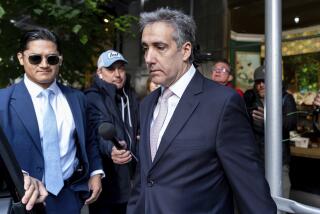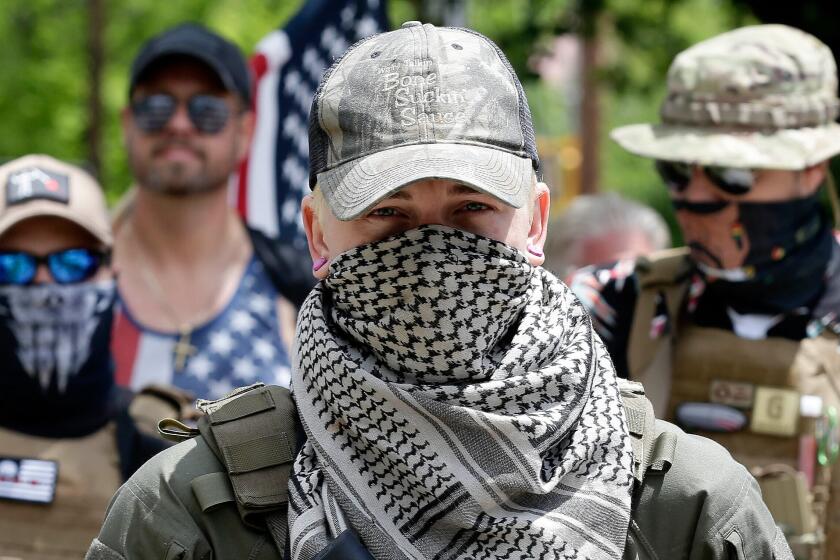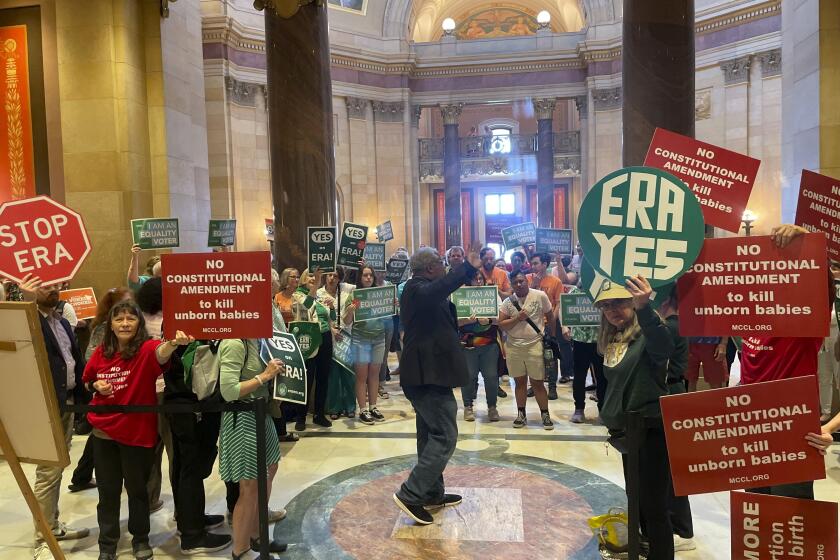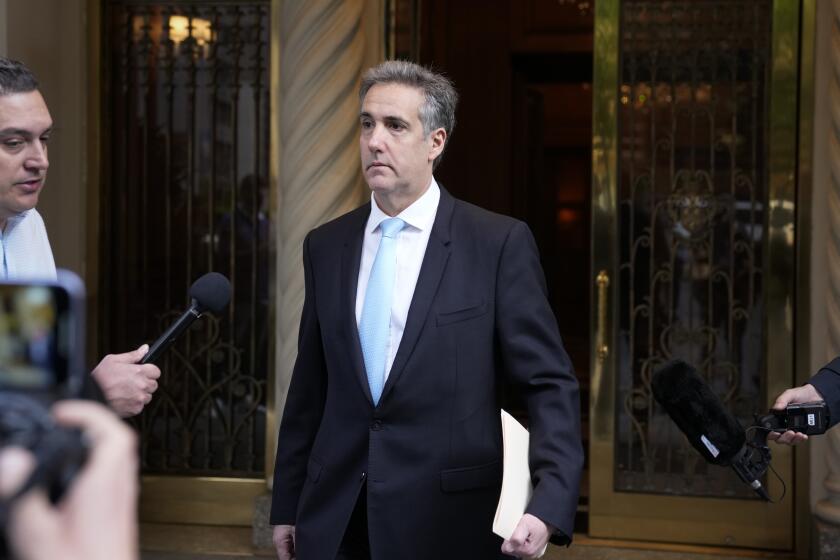U.S. Talib Goes to Court on Conspiracy Counts
His hair and beard shorn, a made-over John Philip Walker Lindh stood accused Thursday in the heavily fortified federal courthouse where lawyers will lay out conflicting versions of his story: Was he a traitor working with the Taliban or a brainwashed kid from Northern California?
Lindh said little to the judge, except to acknowledge the gravity of the terrorist conspiracy charges against him. It fell moments later to his parents and their team of gray-suited lawyers to speak in his defense outside the courthouse here in this Washington suburb.
His father said he was no turncoat; his mother said the United States is his true home.
“He never meant to harm any American, and he never did harm any American,” Frank Lindh said. “John is innocent of these charges.”
But prosecutors, from Atty. Gen. John Ashcroft--who spoke at a separate news briefing--down to a phalanx of government lawyers that packed the hearing, insisted that Lindh freely chose to fight for the enemy, before and even after the terrorist strikes of Sept. 11.
Lindh, Ashcroft said, “will be held responsible in the courtroom for his choices.”
The early morning hearing--held hours after Lindh arrived back in the United States under heavy guard--brought together his parents from the West Coast, government prosecutors and the team of high-powered attorneys who will defend him.
Security was extraordinarily tight, as armed officers in black SWAT uniforms positioned themselves outside the courthouse and in the surrounding streets. And the mob of reporters and camera crews offered a glimpse of the media frenzy that will accompany the case.
If convicted, Lindh could be sentenced to life in prison with no parole. If new charges of treason are added--a possibility that U.S. Atty. Paul McNulty left open after the hearing--Lindh could face the death penalty.
He was captured last fall during the war in Afghanistan, and he immediately gained celebrity as the “American Talib”--a naive, privileged young man who converted to Islam and made his way to that far corner of the world.
The image of a disheveled Lindh--unkempt hair, grizzled black beard and frightened, sometimes angry eyes--has been replayed almost incessantly on American newscasts.
But it was clear from Thursday’s events that his family and attorneys are seeking to soften that image.
His lawyers said he would no longer use his Islamic names, Suleyman al-Faris and Abdul Hamid. Nor would he use John Walker, the name he first gave to authorities. He would once again use his given name, John Lindh.
Last week, he was charged with federal offenses including conspiring to kill U.S. citizens overseas and providing material support and resources to foreign terrorist organizations.
Lindh entered the courtroom in a green jail jumpsuit, the word “PRISONER” emblazoned in white letters across his back. His father and his mother, Marilyn Walker, sat near their son as the charges were read, and U.S. Magistrate W. Curtis Sewell sought to make sure Lindh knew what was happening.
In contrast to his sometimes confused countenance in television news footage, Lindh appeared quite composed.
Did he understand the charges against him?
“Yes, I understand the charges,” he said.
Did he understand the possible punishment?
“Yes, I understand generally.”
Anything further?
“No, I don’t have any questions.”
The judge set a Feb. 6 bail hearing, and the brief session ended. The seventh-floor courtroom, rimmed inside and out with security officers, slowly emptied.
Earlier, Lindh had met for about 20 minutes with his parents, speaking to them through a security screen. He also huddled with his lawyers for 45 minutes. The defense team, assembled by his father, who is also a lawyer, includes four former federal prosecutors.
Among them is Bill Cummings, the onetime U.S. attorney in this eastern Virginia district, and George Harris, who served as a special prosecutor in the Iran-Contra case.
The chief lawyer, James J. Brosnahan of San Francisco, who was an Iran-Contra special prosecutor, said the parents’ meeting--their first with their son since before Sept. 11--was monitored by the FBI. The lawyers’ session was not, he said.
In front of the courthouse, the parents, who are separated, spoke of their devotion to their middle child. Marilyn Walker, appearing near tears, offered her first public remarks in her son’s case.
“It’s been two years since I last saw my son,” she said. “It was wonderful to see him this morning. My love for him is unconditional and absolute, and I am grateful to God that he’s been brought home to his family, me, his home, his country.”
Frank Lindh expressed relief that his son had received medical assistance aboard a Navy ship and appeared to be feeling well. “We’re very grateful to see that John is in good physical condition,” he said.
Frank Lindh then began to speak more like a lawyer, insisting that his son was not the enemy and that he had never raised a rifle in threat to U.S. forces or their allies.
“John did not take up arms against America,” Lindh said, proclaiming his son’s innocence.
Brosnahan went on the offensive, arguing that the young man was deprived of legal assistance for too long and that any statements he may have made to U.S. interrogators should be tossed out.
“For 54 days, the United States government has kept John Lindh away from a lawyer,” Brosnahan said. “He began requesting a lawyer almost immediately, which would have been Dec. 2 or 3. For 54 days, he was held incommunicado.”
But Ashcroft sharply denied that there was any coercion and maintained that Lindh twice declined the assistance of a lawyer while he was being held abroad.
He said Lindh “chose to join terrorists who wanted to kill Americans. And he chose to waive his right to an attorney, both orally and in writing, before his statement to the FBI.”
Prosecutors have used that statement as a key building block for the charges against Lindh, alleging that he left the U.S. several years ago and found his way into the arms of the Taliban.
McNulty, whose office in Alexandria is prosecuting the case, also said Lindh was getting legal help. “He had a right to meet with his counsel,” McNulty said. “He met with them this morning.”
The key legal question, initially, will center on whether Lindh was treated as a prisoner of war or a criminal defendant, and whether he was properly advised of his rights before he spoke with the FBI.
When that question is resolved, the broader issue surfaces: Was he indeed a soldier for Osama bin Laden’s terrorist network, or was he in the Middle East merely in pursuit of his religious faith, and there fell unwittingly onto the wrong side of American interests?
“At no time did he ever actually harm any American,” Brosnahan maintained.
Asked what Lindh was doing in Afghanistan, Brosnahan paused. “That’s a long story,” he said. “But we’re going to get to that.”
How that will play to a jury remains unclear.
“American people love trials,” Brosnahan said. “That’s why there are so many on television. Don’t miss this trial. Be there.”
More to Read
Get the L.A. Times Politics newsletter
Deeply reported insights into legislation, politics and policy from Sacramento, Washington and beyond. In your inbox three times per week.
You may occasionally receive promotional content from the Los Angeles Times.







